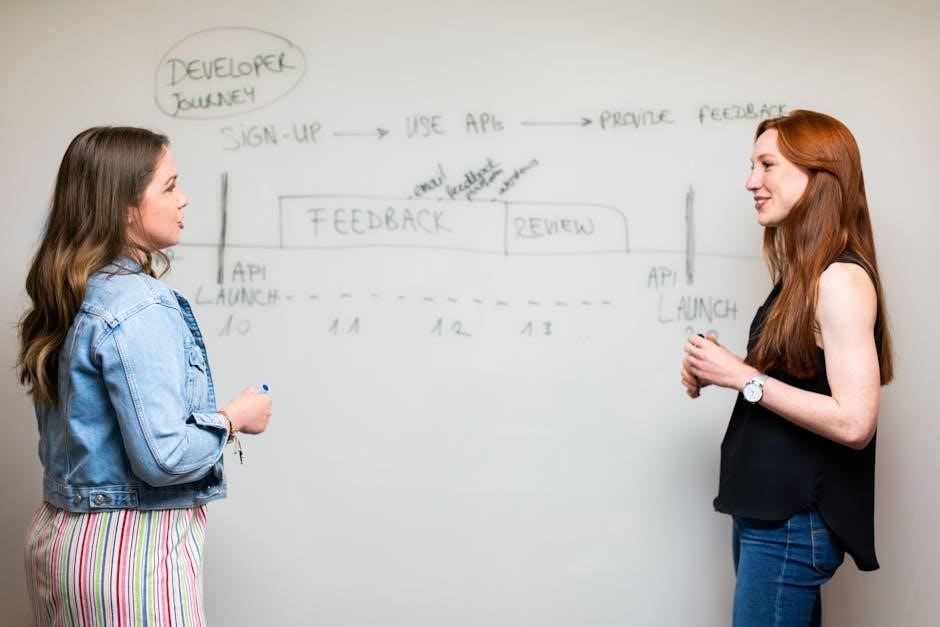Disciplined Entrepreneurship offers a systematic approach to building successful startups, moving beyond storytelling with practical tools and frameworks. It emphasizes innovation, validation, and a structured mindset for entrepreneurs.
Overview of the Concept
Disciplined Entrepreneurship, developed by Bill Aulet, is a systematic and evidence-based approach to building successful startups. It transitions entrepreneurship from an artisanal practice to a teachable, scalable discipline. The framework emphasizes innovation, customer validation, and a structured mindset to minimize risks and maximize success. By focusing on a 24-step process, entrepreneurs can methodically address key challenges, from identifying market opportunities to scaling their ventures. This approach challenges the myth that entrepreneurship is an innate talent, instead offering a practical roadmap for anyone to learn and apply entrepreneurial skills effectively.
Importance of a Systematic Approach to Entrepreneurship
A systematic approach to entrepreneurship is crucial for minimizing risks and maximizing success. By following a structured framework like the 24-step process, entrepreneurs can navigate uncertainty and make informed decisions. This method ensures that each critical aspect of building a business, from identifying market needs to scaling operations, is addressed methodically. A systematic approach also fosters accountability, reduces reliance on intuition, and provides a clear roadmap for overcoming obstacles. Ultimately, it transforms entrepreneurship into a teachable discipline, enabling aspiring entrepreneurs to achieve their goals more effectively and sustainably.

The 24-Step Framework
The 24-Step Framework provides a structured, sequential approach to entrepreneurship, guiding startups from concept to scaling. It emphasizes iteration and refinement, ensuring each step builds a strong foundation.
Structure and Organization of the Framework
The 24-Step Framework is organized into six distinct themes, each representing a critical phase of entrepreneurship. These themes guide entrepreneurs through customer discovery, business model design, and scaling strategies. Each step within the framework is sequential but allows for iteration, enabling entrepreneurs to refine their ideas as they progress. The structure ensures a disciplined approach, starting with identifying customer needs and culminating in scaling a successful business. This systematic organization provides clarity and reduces uncertainty, making the framework accessible and actionable for entrepreneurs at all stages.
Key Principles Behind the 24 Steps
The 24-Step Framework is rooted in core principles that emphasize systematic execution, customer-centric innovation, and rigorous validation. It prioritizes identifying and testing key assumptions to minimize risk and maximize value creation. The framework also stresses the importance of iteration, allowing entrepreneurs to refine their ideas based on feedback and data. By focusing on teachable, repeatable processes, it challenges the notion that entrepreneurship is an innate talent, making it accessible to anyone willing to learn and apply the discipline. These principles ensure a structured yet flexible approach to building successful ventures.
Core Principles of Disciplined Entrepreneurship
Disciplined Entrepreneurship focuses on systematic processes, customer-centric innovation, and rigorous validation of assumptions. It emphasizes a teachable, repeatable approach, fostering a structured mindset for entrepreneurial success.
Distinguishing Two Types of Entrepreneurship
Disciplined Entrepreneurship identifies two distinct types of entrepreneurship: one driven by innovation and market needs, and another focused on lifestyle or replicating existing businesses. This distinction helps entrepreneurs understand their goals and develop strategies aligned with their vision. By recognizing these differences, entrepreneurs can better navigate the challenges of building a successful startup. This framework emphasizes the importance of innovation and customer-centric approaches, providing a clear path for those aiming to create impactful and scalable businesses.
The Role of Innovation in Entrepreneurship
Innovation is central to Disciplined Entrepreneurship, serving as the driving force behind successful startups. It involves creating unique solutions to real problems, differentiating businesses in competitive markets. Innovation isn’t limited to technology; it applies to processes, business models, and customer experiences. By fostering a mindset that embraces creativity and continuous improvement, entrepreneurs can develop innovative strategies that meet market needs and deliver value. This approach ensures long-term sustainability and growth, making innovation a cornerstone of entrepreneurial success.

Practical Tools and Techniques
Disciplined Entrepreneurship provides practical tools like the 24-step framework, helping entrepreneurs systematically validate ideas and build successful startups through actionable strategies and techniques.
These tools enable entrepreneurs to identify and test key assumptions, ensuring robust decision-making and increasing the likelihood of success in innovative ventures.
Identifying and Testing Key Assumptions
In Disciplined Entrepreneurship, identifying and testing key assumptions is crucial for validating business ideas. This process ensures entrepreneurs understand their target market and refine their value proposition effectively. By systematically challenging assumptions, startups can avoid costly mistakes and build a solid foundation for growth. Practical techniques like customer interviews and MVPs (Minimum Viable Products) are emphasized to gather real-world feedback. This iterative approach fosters resilience and adaptability, driving entrepreneurs toward scalable and sustainable solutions. Regularly revisiting and refining assumptions ensures alignment with market needs, enhancing the likelihood of long-term success.
Using Real-World Examples and Case Studies
Disciplined Entrepreneurship leverages real-world examples and case studies to illustrate the practical application of its 24-step framework. These examples, drawn from successful startups and seasoned entrepreneurs, provide actionable insights into navigating challenges. By analyzing these cases, entrepreneurs can learn how to identify market opportunities, validate assumptions, and refine their business models. Bill Aulet’s work includes stories from MIT’s entrepreneurship ecosystem, showcasing how disciplined approaches lead to scalable solutions. These examples highlight the importance of iteration, resilience, and customer-centric innovation, offering invaluable lessons for aspiring entrepreneurs aiming to turn ideas into impactful ventures.

The Role of Mindset in Entrepreneurship
A disciplined entrepreneurial mindset is crucial for turning ideas into successful ventures. It emphasizes resilience, adaptability, and continuous improvement, ensuring entrepreneurs stay focused and innovative in pursuit of their vision.
Developing a Disciplined Entrepreneurial Mindset
Cultivating a disciplined entrepreneurial mindset involves embracing resilience, adaptability, and a proactive approach to problem-solving. Entrepreneurs must adopt a systematic mindset, focusing on iterative refinement and continuous learning. Bill Aulet’s framework emphasizes the importance of testing assumptions and iterating based on feedback. A disciplined mindset also requires entrepreneurs to balance creativity with practical execution, ensuring ideas are grounded in market realities. By fostering this mindset, entrepreneurs can navigate uncertainty, persist through challenges, and systematically build successful ventures. This approach transforms entrepreneurship from an art into a skill that can be learned and mastered over time.
Overcoming Common Obstacles
Entrepreneurs often face challenges like limited resources, market uncertainty, and validating assumptions. Aulet’s framework provides practical tools to address these obstacles, emphasizing iterative testing and feedback. By focusing on customer needs and systematically refining ideas, entrepreneurs can minimize risks and adapt to changing conditions. Resilience and adaptability are key, as setbacks are inevitable but not insurmountable. A disciplined approach ensures entrepreneurs stay focused on scalable solutions while maintaining the flexibility to pivot when necessary. Overcoming obstacles requires a mindset shift from viewing challenges as roadblocks to seeing them as opportunities for growth and refinement.
Real-World Applications
Real-world applications of Disciplined Entrepreneurship include MIT’s entrepreneurship boot camps, empowering individuals in challenging environments, and fostering innovation-driven startups globally, driving economic freedom and growth.
Success Stories and Case Studies
Disciplined Entrepreneurship has empowered numerous entrepreneurs globally, with notable success stories emerging from MIT’s entrepreneurship boot camps. Participants from war-torn countries successfully launched ventures, achieving economic freedom and societal impact, showcasing the framework’s effectiveness in diverse contexts.
Case studies highlight how entrepreneurs applied the 24-step framework to validate ideas, refine business models, and scale innovations. These real-world examples demonstrate the practicality of the approach, inspiring others to adopt systematic entrepreneurship for sustainable success.
Impact on Entrepreneurship Education
Disciplined Entrepreneurship has revolutionized entrepreneurship education by shifting from anecdotal storytelling to a systematic, tool-based approach. Bill Aulet’s 24-step framework provides a structured curriculum, enabling educators to teach entrepreneurship as a learnable craft rather than an innate talent. This has led to the adoption of Disciplined Entrepreneurship methodologies in universities and boot camps worldwide, fostering a generation of entrepreneurs equipped with practical skills and a disciplined mindset. The framework’s integration into educational programs has significantly improved the effectiveness of entrepreneurship training, preparing students to navigate real-world challenges successfully.

Additional Resources
Additional resources include the Disciplined Entrepreneurship Workbook, offering practical tools, a free PDF guide, and a complimentary poster detailing the 24-step framework for quick reference for entrepreneurs.
Disciplined Entrepreneurship Workbook
The Disciplined Entrepreneurship Workbook complements the original book, offering practical exercises and tools to master the 24-step framework. It provides hands-on activities to refine business ideas, validate assumptions, and develop a scalable business model. Readers gain access to real-world examples and case studies, enabling them to apply theoretical concepts to real entrepreneurial challenges. The workbook emphasizes a systematic approach, helping entrepreneurs improve their business plans and strategies. It serves as an essential resource for both first-time entrepreneurs and seasoned professionals seeking to enhance their skills and increase their chances of success in the competitive startup landscape.
Free PDF and Online Resources
Disciplined Entrepreneurship resources are widely available online, including free PDF downloads of the book and workbook. Platforms like LitRes and Wiley offer these materials, providing entrepreneurs with accessible tools. The free PDF versions allow readers to explore the 24-step framework and practical exercises without cost. Additional online resources, such as posters and summaries, complement the learning experience. These materials are designed to support entrepreneurs in applying the systematic approach outlined by Bill Aulet, making disciplined entrepreneurship accessible to a global audience.

The Future of Entrepreneurship
The future of entrepreneurship lies in fostering innovation and systematic approaches, ensuring scalable and sustainable businesses through disciplined frameworks and continuous learning.
Trends and Innovations in Entrepreneurship
Current trends emphasize systematic approaches and innovation-driven strategies, moving beyond traditional storytelling methods. The integration of technology and data analytics enables entrepreneurs to validate ideas swiftly. Bill Aulet’s 24-step framework highlights the importance of structured methodologies for startup success, fostering a culture of disciplined entrepreneurship. Educators and practitioners increasingly adopt these frameworks, promoting scalable and sustainable business models. Innovations in digital tools and global connectivity further enhance entrepreneurs’ abilities to test assumptions and refine offerings. These trends underscore the shift toward evidence-based entrepreneurship, empowering diverse groups to innovate and thrive in dynamic markets.
Expanding Opportunities for Entrepreneurs
Disciplined Entrepreneurship democratizes access to startup success by providing a structured, teachable framework. It empowers individuals from diverse backgrounds to innovate, fostering inclusivity in entrepreneurship. The 24-step approach ensures scalability, enabling entrepreneurs to refine ideas and build sustainable businesses. Global connectivity and digital tools further reduce barriers, offering resources like free PDF guides and online courses. This systematic methodology bridges gaps in entrepreneurship education, equipping aspiring entrepreneurs with practical skills. By emphasizing innovation and validation, it creates pathways for underrepresented groups to thrive, driving economic growth and societal impact on a global scale.
Disciplined Entrepreneurship provides a proven framework for startups, combining innovation with practical tools to ensure success. It transforms entrepreneurial potential into actionable results, empowering entrepreneurs globally.
Disciplined Entrepreneurship provides a systematic, 24-step framework for building successful startups, emphasizing innovation, validation, and a structured mindset. It debunksthe myth that entrepreneurs are born, showing entrepreneurship as a learnable craft. Key takeaways include the importance of testing assumptions, leveraging innovation, and adopting a disciplined approach. The framework integrates practical tools and real-world examples, offering a clear path to entrepreneurial success. By focusing on actionable steps and overcoming common obstacles, entrepreneurs can increase their chances of creating impactful, scalable businesses. This approach transforms entrepreneurial potential into tangible, sustainable outcomes.
Final Thoughts on Disciplined Entrepreneurship
Disciplined Entrepreneurship offers a transformative approach to startup success, providing a clear, actionable framework for entrepreneurs. By emphasizing innovation, validation, and a structured mindset, it empowers individuals to turn ideas into scalable businesses. The 24-step process, combined with practical tools, ensures entrepreneurs can systematically navigate challenges and refine their strategies. This approach not only democratizes entrepreneurship but also enhances education and real-world applications. Ultimately, Disciplined Entrepreneurship proves that entrepreneurship is a skill that can be learned and mastered, fostering a culture of disciplined innovation and sustainable success for aspiring entrepreneurs worldwide.